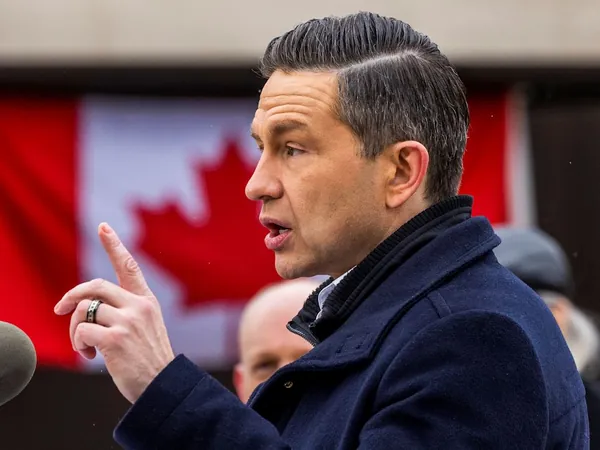
Bourbon Battles: Bipartisan Uproar as Trump's Tariffs Threaten Kentucky's Whiskey Industry
2025-03-14
Author: Benjamin
Introduction
In a surprising twist of politics, President Donald Trump’s controversial tariffs have sparked an unprecedented bipartisan alliance among Kentucky’s political elite. Democratic Governor Andy Beshear and Republican Senators Mitch McConnell and Rand Paul are rallying together against the escalating trade wars that pose a grave threat to Kentucky’s bourbon industry.
Impact of Tariffs on the Bourbon Industry
As tensions rise globally over trade policies, bourbon distillers, who have diligently spent years penetrating markets in Europe and Canada, fear they may soon find themselves as “collateral damage” in retaliatory tariff skirmishes. Just this week, Trump intensified the rhetoric by threatening a staggering 200 percent tariff on European wine, Champagne, and various spirits if the European Union proceeds with a planned tariff on American whiskey.
Political Unity in Kentucky
In Kentucky—a staunchly Republican state where Trump’s influence has been omnipresent since his 2016 campaign—there is an unusual sense of unity among state leaders in their disapproval of the ongoing chaos surrounding tariffs. Beshear, eyeing a possible run for the presidency in 2028, has been particularly vocal, asserting, “President Trump started this trade war, and we all knew that if he did, other countries would have to respond. What they’re going to do is raise prices on the American people. A president who was elected to lower prices is taking steps that are raising them instead.”
Former Senate Majority Leader McConnell echoed these sentiments, emphasizing the millions of American jobs—thousands of which are tied to bourbon production and automobile manufacturing in Kentucky—rely on stable trade policies. He stated, “I’m all for pushing back on predatory trade practices, but I’m not a fan of tariffs. At the end of the day, tariffs drive up the cost of goods and services, and American consumers pay the price.”
Senator Rand Paul also chimed in, labeling the tariff conflicts as a grave mistake that is detrimental to his home state. “From bourbon distillers to car manufacturers, nobody in Kentucky is coming up to me and saying, ‘please put tariffs on things,’” Paul remarked. He emphasized the need to reduce tensions rather than escalate them further.
Economic Implications
In a testament to Kentucky's robust economy, the state hit a record high of $47.7 billion in exports in 2024, marking an impressive 18.7 percent increase from the previous year. Aerospace products topped the list of exports, while motor vehicles and pharmaceuticals also contributed significantly to Kentucky's economic prowess.
The Threat to Bourbon Exports
However, it is the world-famous bourbon that currently stands at the brink of a trade disaster. In response to heightened tariffs, Canadian liquor stores have begun pulling American spirits from their shelves. Meanwhile, European Union actions include raising tariffs on a slew of American products, such as beef, poultry, motorcycles, and indeed, bourbon.
The Future of American Whiskey Exports
The escalating trade hostilities threaten to derail a burgeoning success story in American whiskey exports. The EU remains the largest international market for American whiskeys, and when tariffs were previously suspended, exports surged nearly 60 percent, climbing from $439 million in 2021 to $699 million in 2024, as reported by the Distilled Spirits Council.
Voices from the Industry
For Tom Bard, a craft distiller in western Kentucky, the tariff conflicts have stifled growth opportunities for his brands in Eastern Europe and Canada. “We were just starting to gain momentum, and now it feels like we’ve hit a brick wall,” Bard lamented, reflecting the frustrations of many producers navigating these tumultuous waters.
Conclusion
As Kentucky grapples with the challenges posed by Trump’s tariffs, the united front from its leaders underscores just how critical the bourbon industry is to the state's economy and cultural identity. The question now looms: will this bipartisan alliance succeed in mitigating the adverse effects before it’s too late?









 Brasil (PT)
Brasil (PT)
 Canada (EN)
Canada (EN)
 Chile (ES)
Chile (ES)
 Česko (CS)
Česko (CS)
 대한민국 (KO)
대한민국 (KO)
 España (ES)
España (ES)
 France (FR)
France (FR)
 Hong Kong (EN)
Hong Kong (EN)
 Italia (IT)
Italia (IT)
 日本 (JA)
日本 (JA)
 Magyarország (HU)
Magyarország (HU)
 Norge (NO)
Norge (NO)
 Polska (PL)
Polska (PL)
 Schweiz (DE)
Schweiz (DE)
 Singapore (EN)
Singapore (EN)
 Sverige (SV)
Sverige (SV)
 Suomi (FI)
Suomi (FI)
 Türkiye (TR)
Türkiye (TR)
 الإمارات العربية المتحدة (AR)
الإمارات العربية المتحدة (AR)